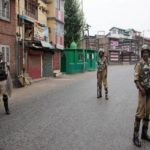India locks down media in Held Kashmir
SRINAGAR – Police seized tens of thousands of newspapers in Indian-held Kashmir early Saturday and detained printing press workers, ramping up an information blackout after a week of unrest left 39 dead, officials and media outlets said.
Teams of officers swooped on major newspaper offices in the restive region overnight, seizing printing plates in an attempt to curb news of fatal clashes from spreading as a curfew was extended into its eighth day.
With internet and mobile networks already suspended, authorities halted cable television, fearing news of protesters’ deaths could fuel further protests after the restive region’s worst violence in years.
“Police on Saturday night raided the printing press and seized the printed copies of Kashmir Reader,” the English language daily said on its website, adding that eight of its workers had been arrested. Newspaper copies that had reached some distributors in the main city of Srinagar were also taken by police, said Irfan, a local who gave only one name.
“The policemen seized the plates of Greater Kashmir (newspaper) and more than 50,000 printed copies of (Urdu-language daily) Kashmir Uzma and closed down the GKC printing press,” said another group that publishes the region’s highest-circulation newspaper, adding that three of its workers had been detained.
Abdul Rashid Mukhdoomi, printer and publisher of Greater Kashmir, said police raided his printing press at 2 am and “took away all the newspapers that were printed and the printing was also stopped”. “We were not handed over any order under which the printing and circulation of our newspapers were stopped,” Mukhdoomi told Reuters.
The disputed territory has been gripped by a week of intensifying unrest sparked by the killing of a popular, young Kashmiri commander, Burhan Wani, in a firefight with government forces on July 8.
“These are difficult times here. This is one of the ways to contain the mayhem,” a senior local government official told AFP on condition of anonymity.
“The clamp-down was necessitated as Pakistani channels that are beamed here through cable television network have launched a campaign aimed at fomenting trouble here,” said a Jammu and Kashmir government minister who declined to be named.
“Some newspapers were also sensationalising the violence … We will take a decision on (their) restoration after July 19,” he told Reuters.
Also on Saturday, the Indian army said it had killed three “terrorists” who tried to enter from the Pakistan side of the unofficial border that divides Kashmir between the two countries.
Protesters in the past week have torched police stations and armoured vehicles, and hurled stones at military camps in the restive territory where an estimated 500,000 Indian troops, deeply resented by locals, are stationed. More than 3,000 people have been injured, including around 200 police, while hospitals have struggled to cope with the rush of injured protesters.
Hundreds have bullet wounds including many who suffered severe eye injuries caused by shotgun pellets fired by the police. The violence is the worst since 2010 when huge rallies were crushed, leaving 120 dead. New Delhi has rushed in more troops to contain the violence and flown in eye specialists to deal with injuries caused by pellets.
Amjad Noor, owner of Site Entertainment Network which runs a cable network in Srinagar, told Reuters police told his organisation to shut down operations last night. Kashmiri leaders on Friday evening called for a 72-hour strike and protests against the killings of civilians. They said in a statement they also supported Pakistan’s call to observe a “black day” against the killings.
The latest unrest has heightened tension between the nuclear-armed rivals, with Pakistan Prime Minister Nawaz Sharif calling on his nation to observe a “black day” on July 20 in solidarity with the people of Kashmir.
India’s foreign ministry said on Friday it was dismayed by Pakistan’s attempt to “interfere in our internal matters”
Source. AFP / The Nation
